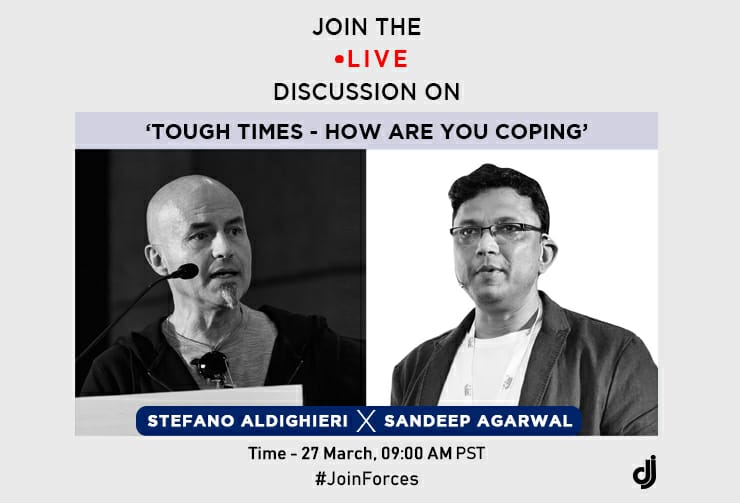Continuing our series of #COVIDTIMES instagram live talks, Sandeep Agarwal spoke to Stefano Aldihieri – well known denim designer and consultant- from USA. He gave an idea of what he feels of the situation and how he feels it will affect our industry and working. We bring a synopsis of discussion held with him below .
Hey Stefano, how are you doing? Hope you and all your family and friends are ok?
Hey Stefano, how are you doing? Hope you and all your family and friends are ok?
Everything is ok. I am At home in a Lockdown. Things are pretty relaxed over here and that is why I think that’s actually going to be a real problem going forward . The way you guys in India doing it seems to be a little bit tighter, more similar to what China did, and I know it’s going to be really difficult for a lot of people in India.
So what do you think I mean how are you coping with this and what are you doing at a personal and professional level?
I came back from Europe, they blocked all the travels from Europe and the thing is I don’t think I’d be able to travel back to Europe for a while now, because it’s going to take a while for them to get things sorted. I’m pretty much in the same boat as most people. We cannot travel and we have to try and do some work from home. In our job, it’s difficult to do everything remotely but I am sure we can use the technology to communicate but when it comes to product there’s not much you can do.
You cannot really show a garment or you cannot touch it and you cannot really have a good feel. On top of that pretty much everything is frozen, as you know all the stores in Europe, in the states, in many parts of Asia are shut down, so there is absolutely zero commerce going on to trade.
What do you think about how much time it will take for the situation to come back to normal?
Nobody knows. If you look at what happened in other places: in China it took about two and a half months of lockdown for them to pretty much eradicate it. Now they have to be careful about the people traveling into the country. I think it’s pretty much under control, most factories have come back to work and the stores are reopening, so life is slowly going back to normal. Other countries, like if you look at Italy or Spain or other places in Europe, I think they have reached the peak of the spread, and so things will probably start to get better over the next few weeks.
Other parts of the world, like where we live and where you live, are going to take much longer because we’ve only just started. So here I’m afraid that we’re going to see the same situation as in Italy or Spain within the next couple of weeks, it’s going to be real bad real soon. I think we have just seen the beginning of it. In New York, It’s faster because of course, it’s a much more densely populated place and there’s a lot of people traveling from all over the place, so yes, this country is going to take a little bit longer. California is speeding up, although not as fast as New York, but it’s going to get up here and so yeah it’s not good. Obviously your guess is as good as mine, but I think we’re looking at months, not weeks.
How’s Industry gonna cope up?
It’s a catastrophe. All the stores have closed, the retailers are not selling anything, of course, they have started canceling all the orders because, while we can say it’s a horrible thing, we also need to consider that, there’s no point getting goods if you’re not going to sell them, and if you don’t have a place to store them, you’re not going to send it to the stores, when you know you’re not going to sell them now.
One could argue jeans are not a seasonal product, so you could say, yeah if I don’t sell it now, I can sell it in one month, two months from now. It’ll still be okay it’s not a perishable goods. Other product is going out of fashion fast, but at the same time if there are no people working in the warehouse, then how do you even take the goods in. Also, all the retailers, especially in Europe, still have to pay all their employees –it is not like here, where they fire everybody overnight and then possibly rehire them when things reopen. So European retailers are all carrying huge costs right now – huge overheads, and even without working they still have to pay rent, still have to pay utilities and salaries.
We just read this morning that Primark is refusing to pay millions and millions of dollars of rent, and I think that’s just the tip of the iceberg. Few more will follow you and one can imagine what happens when all the big retailers stop paying rent in those big malls. The other end the really tragic side is along the supply chain, because everybody’s now pushing the buck to the next stop, and of course factories are not making anything now, they’re not getting paid for the work they’ve done. And fabric companies can’t count on any new orders going forward, so they’re going to going to be stuck for a while, and then the yarn, and the dyestuff, and the finishing product… So the whole chain is affected, which is tragic.
Once this is over and people out again do you think there will be some changes in the way people will do the shopping and do you think the habits will change
Well, that’s a really good question because I’ve been thinking about that myself, on one hand, there’s going to be possibly an issue with the availability of goods because if you stop everything it’s not like you can turn the switch on, and everything starts flowing into your stores right away, especially with production being done so far from the markets. It takes time -it takes time – for fabric mills to restart, and then they’ll have to ship the fabrics the factories, and factories have to make the goods, and then either ship or fly them. Now even if you fly them, you’re looking at several weeks of gap between when we reopen and when goods can start flowing in again, there might be a temporary advantage for the factories that are close to the markets, so for the US, I think there will be Mexican factories. For Europe, you’re going to probably see Turkey, unless they get hit very badly – and maybe parts of Eastern Europe and North Africa; those could have a temporary advantage, but of course if they don’t have fabric then there’s no advantage.
On the other hand, for people going to stores, that is going to be interesting, because we’re going to have people who will come out after weeks or months and there could be two different reactions.
One is that people will have gotten used to it and will say, well, maybe I don’t need to buy all the stuff, and I don’t need to go to the stores every other day and pick up something that I don’t really need, and maybe I have different priorities now in life and I realize there are other things that are more important. Or there could be people that are so desperate to go back to and will go crazy again, but I think, even in such a case, availability is going to be an issue. Availability is going to be an issue if all the orders are going to be canceled, then there is going to be a gap when we re-open.
It’s going to be a really really bad year, as we may lose the entire summer season and we really have no idea, I think by winter we might be back to normal, but there will still be some issues, because of the forced closure. I have a feeling that some of the brands and retailers that were already shaky before, they probably shut down now and are not going to be able to reopen, and some of the factories that are being hit now by the cancellations will not really have the means to go back to work, so they won’t be able to rehire their workers. Some governments will have to take extraordinary measures to make up for the difference and they will try to prioritize what is best for their countries.
For the retailers who are canceling currently, I thought that instead of canceling if they just offered a kind of a moratorium for two months or three months and then restart the dialogue again, what your thoughts on it?
There’s no easy solution, but what is going to be interesting to see is how committed they will still be to the whole sustainability and ethical principles, all these companies. Because one thing is to say that you are you’re committed to doing everything socially right, and ethically right, and environmentally right when things go relatively well, but when you’re into an emergency like this you tend to forget those things.
You know they were all racing to who was the most sustainable company out there up to a few weeks ago? I want to see how many of those are really, really serious about it, and how many will not stick to those principles because being sustainable means also taking care of your partners in the supply chain, and I know it’s a really really difficult thing to do, because at some point you have to decide what you’re going to cut, what are you going to sacrifice, and unfortunately it is human nature to take care of the ones that are closer to you than the ones who are far away.
Positive takeaways from this situation and your advice?
Well, we have to try and be optimistic and I think this situation can bring out the worst in us, like people price gouging or taking advantage of this is, which is absolutely unforgivable, but there’s also a lot of people who are showing a lot of compassion towards the others. Finally realizing how much incredible work all the other people in the health care world are doing, like all these nurses and doctors and janitors who work in the hospitals.
They live really really hard lives for not such a great financial retribution, and they don’t even get a lot of satisfaction most of the time, we take those things for granted. Also, people will try to go and find something that is more durable and better quality than disposable, and that is great. I don’t know if you hear the birds here, nature is blooming right now, with less pollution, even my friend in Milano said the air is clean in Milano, we can breed finally, I even saw pictures of the canals in Venice with the water so clean and it’s incredible.
Hey Stefano, how are you doing? Hope you and all your family and friends are ok?
Everything is ok. I am At home in a Lockdown. Things are pretty relaxed over here and that I think that’s actually going to be a real problem going forward . The way you guys in India doing it seems to be a little bit tighter more similar to what China did and I know it’s going to be really difficult for a lot of people in India
So what do you think I mean how are you coping with this and what are you doing at a personal and professional level?
I came back from Europe, they blocked all the of the travels from Europe and the thing is I don’t think I’d be able to travel back to New York for a while now because it’s going to take a while for them to get things sorted. I’m pretty much in the same boat as most people. We cannot travel and we have to try and do some work from home. In our job, it’s difficult to do everything remotely but I am sure we can use the technology to communicate but when it comes to product there’s not much you can do.
You cannot really show a garment or you cannot touch it and you cannot really have a good feel. On top of that pretty much everything is frozen, so as you know all the stores in Europe in the state in many parts of Asia are shut down so there is absolutely zero commerce going on to trade.

What do you think about how much time it will take for the situation to come back to normal?
Nobody knows. If you look at what happened in other places in China it took about two and a half months of lockdown for them to pretty much eradicate it. Now they have to be careful about the people traveling into the country. I think it’s pretty much under control, most factories have come back to work and the stores are reopening, so life is slowly going back to normal. Other countries I think if you look at Italy or Spain or in other places in Europe I think they reach the peak of the spread and so things will probably start to get better over the next few weeks.
Other parts of the world like where we live and where you live, are going to take much longer because we’ve only just started. So here I’m afraid that we’re going to see the same situation as in Italy or Spain within the next couple of weeks, it’s going to be real bad real soon. I think we have just seen the beginning of it. In New York, It’s faster because of course, it’s a much more densely populated place and there’s a lot of people traveling from all over the place that I so the country is going to take a little bit longer. California is speeding up to not as fast as in New York but it’s going to get up here and so yeah it’s not. Obviously your guess is as good as mine but I think we’re looking at months not weeks
How’s Industry gonna cope up?
It’s a catastrophe. All the stores have closed, the retailers are not selling anything, of course, they have started canceling all the orders because, well we can say it’s a horrible thing we also need to consider that, there’s no point getting goods if you’re not going to sell them and if you don’t have a place to store them you’re not going to send it to the stores, you know you’re not going to sell them now.
One could argue there is no such a season what seasonal product so you could say yeah if I don’t sell it now I can sell it in one month two months from now. It’ll still be okay it’s not a perishable good. It’s really going out of fashion so fast but at the same time if there are no people working in the warehouse then how do you even take the goods in. Although all the retailers, especially in Europe, still have to pay all their employees – not like here what they can do is fire everybody overnight and then possibly rehire them when things they open. So European retailers are all carrying huge costs right now – huge overheads and even without working they still have to pay rent, still have to pay utilities and salaries.
We just read this morning that Primark is it’s refusing to pay millions and millions of dollars of rent and I think that’s just the tip of the iceberg. Few more will follow you and can imagine when all the big retailers stopped paying rent in those big malls. The other end the really tragic side is along the supply chain because everybody’s now pushing the buck to the next and of course factories are not making anything now, they’re not getting paid for the work they’ve done. And fabric companies can’t count on any new orders going forward so they’re going to going to be stuck for a while and then the yarn and the dyestuff and the finishing product। So the whole chain is affected which is tragic.

Once this is over and people out again do you think there will be some changes in the way people will do the shopping and do you think the habits will change
Well, that’s a really good question because I’ve been thinking about that myself, on one hand, there’s going to be possibly an issue with the availability of goods because if you stop everything it’s not like you can turn the switch on anything stop flowing into your stores right away especially with production being done so far from the market it. It takes time -it takes time – for fabric mills to restart and then they’ll have to ship the fabrics the factories have factories have to make the goods and then here to either Ship or fly them. Now even if you fly them you’re looking at several weeks of the gap between when we reopen and when Goods can start flowing in again, there might be a temporary advantage for the sort of factories that are close to the market, so for the US, I think they will see Mexican factories. For Europe, you’re going to probably see Turkey unless they hit very badly – and maybe parts of Eastern Europe and North Africa those could have a temporary advantage but of course if they don’t have fabric and there’s no advantage.
On the other hand, for people going to stores, that is going to be interesting, because we’re going to have people who will come out after weeks or months and there could be two different reactions.
One is that people will get used to it and we say well maybe I don’t need to buy all the stuff and I don’t need to go to the stores every other day and pick up something that I don’t really need and maybe I have different priorities now in life and I realize there are other things that are more important. Or there could be people that are so desperate to go back to and go crazy again but I think in such a case availability is going to be an issue. But availability is going to be an issue if all the orders going to be canceled, then there is going to be a gap when we re-open.
It’s going to be a really really bad year as we may lose the entire summer season and we really have no idea, I think by winter we might be back to normal but there will still be some issues, because of the forced closure. So I have a feeling that some of the brands and the retailers that were already shaky before, they probably shut down and are not going to be able to truly open and some of the factories that are being hit now by the cancellations will not really have the means to go back to work, so they won’t be able to rehire their workers. Some governments will have to take extraordinary measures to make up for the difference and they will try to prioritize what is best for their countries.
For the retailers who are canceling currently, I thought that instead of canceling if they just offered a kind of a moratorium for two months or three months and then restart the dialogue again, what your thoughts on it?
There’s no easy solution but what is going to be interesting is to see how committed they will still be to the whole sustainability and ethical principle of all these companies. Because one thing is to say that you are you’re committed to doing everything socially right and ethically right and environmentally right things relatively well but when you’re into an emergency like this you tend to forget those things.
You know they were all racing to who was the most a sustainable company out there up to a few weeks ago I want to see how many of those are really really serious about it and how many will not stick to those principles because being sustainable means also taking care of your partners in the supply chain and I know it’s a really really difficult thing to do because at some point you have to decide what you’re going to cut what are you going to sacrifice and an unfortunate human nature is to take care of the ones that are closer to you than the ones who are far away.
Positive takeaways from this situation and your advice?
Well, we have to try and be optimistic and I think this situation can bring out the worst of us the worst in us like people price gouging or taking advantage of this is absolutely unforgivable but there’s also a lot of people who are showing a lot of compassion towards the other. Finally realizing how much incredible work all the other people in the health care world are doing like all the other nurses and doctors and janitors who work in the hospitals.
They live really really hard lives for not such a great financial retribution and they don’t even get a lot of satisfaction most of the time we take those things for granted. Also, people will try to go and find something that is more durable and better quality than disposable and the other thing that is great. I don’t know if you hear the bird thing in nature is blooming right now but with less pollution, my friend in Milano said the air is clean in Milano we can breed finally I saw pictures of the canals in Venice with the water so clean and it’s incredible.
Do join us for our next session with Vasco Pizarro from Portugal in our #Covidtimes talks at DENIMSANDJEANS INSTAGRAM at 4pm Portugal time on 3rd April . Follow our page to join the discussion today.


